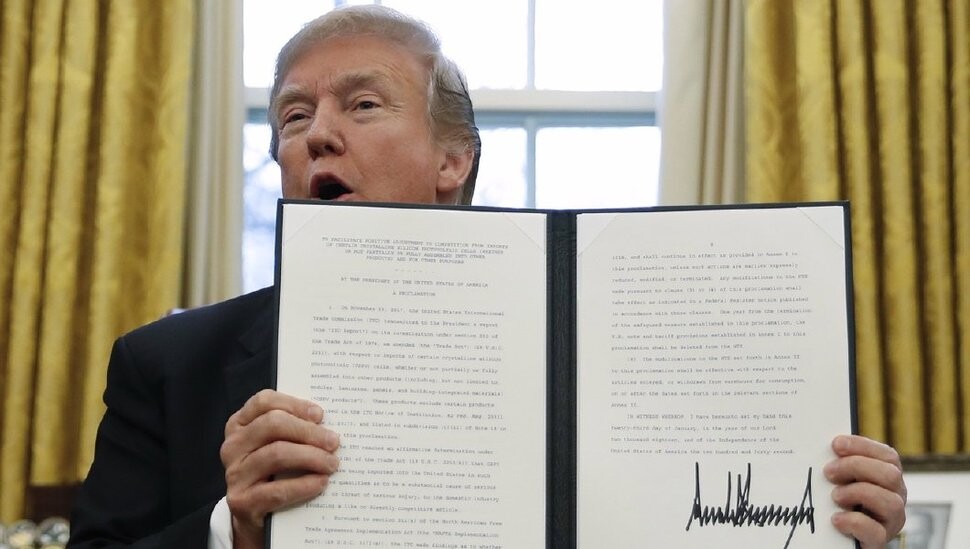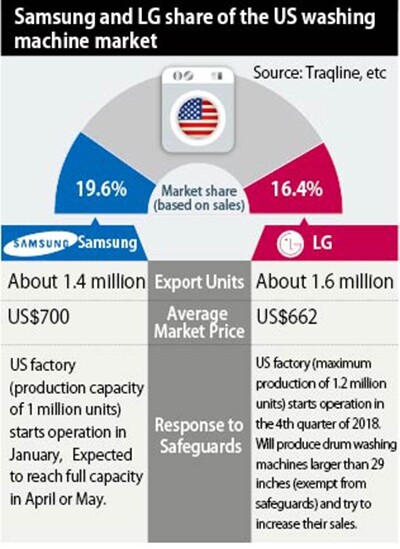hankyoreh
Links to other country sites 다른 나라 사이트 링크
US imposes trade safeguards against South Korean washing machines and solar cells and modules

On Jan. 22, US President Donald Trump approved emergency import restrictions known as safeguards against South Korean large home washing machines and solar cells and modules. Trump’s bombshell decision to impose tariffs against these products despite a plea not to do so made by South Korean negotiators during the first round of talks aimed at revising the South Korea-US Free Trade Agreement (KORUS-FTA) points to increasing bilateral conflict over trade. This is the first time in 16 years, since 2002, that the US has resorted to safeguards, a measure which strictly regulated by the World Trade Organization (WTO) to prevent its abuse.
The Office of the US Trade Representative (USTR) announced on Jan. 23 that President Trump had given his final approval to a recommendation to impose safeguard tariffs on home washing machines and solar cells and modules manufactured overseas. This measure will take effect within 15 days and will last for as long as eight years. A safeguard is a trade barrier that is activated when there are fears that a rapid increase in imports of a given product will inflict severe damage on domestic companies, leading to tariffs or restrictions on the volume of imports of that product from all foreign countries.

The safeguard on washing machines will last for three years, imposing tariffs of 20% (first year), 18% (second year) and 16% (third year) up to the tariff-rate quota of 1.2 million units per year and tariffs of 50%, 45% and 40% beyond that. The tariff-free quota for washing machine parts will increase during those three years from 50,000 to 70,000 and then 90,000, but volume beyond that quota will face a tariff of 50%, 45% and 40%.
Because of the KORUS FTA, the US International Trade Commission had initially recommended that washing machines manufactured inside South Korea be excluded from the safeguard, but no mention of this appears in the document approving the safeguard, leaving no doubt that these washing machines are included as well. Samsung and LG Electronics export around US$1 billion worth of washing machines (around 3 million units) to the US each year. Since the market price of these exported products will have to rise proportionally to the amount of the tariff, their price competitiveness in the American market will erode, inevitably leading to a major reduction in export volume. The current tariff on washing machines exported to the US market is 0.4%.
The safeguard for solar cells and modules will last for four years. There is a 2.5GW tariff-free quota for solar cells. with volume above the quota facing tariffs of 30% (first year), 25% (second year), 20% (third year) and 15% (fourth year). There is no tariff-rate quota for modules, however, which will face tariffs of 30%, 25%, 20% and 15% regardless of volume. Between January and November of last year, South Korean companies exported US$950 million worth of solar cells and modules to the US market. South Korean exporters of solar products are Hanwha Q Cells and LG Electronics.
South Korean negotiators had asked for restrictions to be liftedDuring the first round of KORUS FTA negotiations on Jan. 5, the South Korean government stated that its first demands were ending import restrictions on washing machines and solar cells and modules and improving the investor-state dispute settlement system. The fact that the US nevertheless took the harsh step of activating a safeguard hints that major conflict awaits in the negotiations. There are also concerns that US efforts to restrict imports will expand to other products than washing machines and solar panels, such as South Korean steel. USTR Robert Lighthizer said that this measure makes clear that the Trump administration will protect American workers, farmers, ranchers and businesspeople.
“Whirlpool and General Electric are companies making washing machines that Americans use on a daily basis. It seems that this bold move by Trump is designed to symbolize his commitment to ‘America first,’” said a source at the Korea International Trade Association (KITA).
South Korea to appeal safeguards to WTO and prepare retaliatory tariffs“This safeguard is in clear violation of WTO rules. We will appeal these unfair measures to the WTO,” said South Korean Trade Minister Kim Hyun-chong during an emergency meeting held by government officials and business representatives on Jan. 23. “It’s hard to understand why the US would cause problems for South Korean electronics firms that have built local factories that are contributing to the US economy.”
As a way to combat unfair anti-dumping tariffs that the US has imposed on South Korean washing machines since 2013, South Korean trade authorities are taking steps to impose retaliatory tariffs of their own. The South Korean Trade Ministry announced on Jan. 23 that it had asked for permission during a regular meeting of the WTO’s Dispute Settlement Body in Geneva on Jan. 22 to suspend concessions (that is, impose retaliatory tariffs) on the US in connection with the two countries’ 2013 dispute over washing machines.
Even though the US lost this dispute in 2016, it failed to retract the anti-dumping tariffs, which are still in place to this day, and South Korea is planning to counter by imposing stiff retaliatory tariffs, worth US$700 million a year, on US exports to the South Korean market.
“This application for a suspension of concessions is designed to prompt the US to quickly implement the results of the ruling,” said a South Korean government spokesman.
By Cho Kye-won, staff reporter and Yi Yong-in, Washington correspondent
Editorial・opinion
![[Editorial] Penalties for airing allegations against Korea’s first lady endanger free press [Editorial] Penalties for airing allegations against Korea’s first lady endanger free press](https://flexible.img.hani.co.kr/flexible/normal/500/300/imgdb/original/2024/0502/1817146398095106.jpg) [Editorial] Penalties for airing allegations against Korea’s first lady endanger free press
[Editorial] Penalties for airing allegations against Korea’s first lady endanger free press![[Editorial] Yoon must halt procurement of SM-3 interceptor missiles [Editorial] Yoon must halt procurement of SM-3 interceptor missiles](https://flexible.img.hani.co.kr/flexible/normal/500/300/imgdb/child/2024/0501/17145495551605_1717145495195344.jpg) [Editorial] Yoon must halt procurement of SM-3 interceptor missiles
[Editorial] Yoon must halt procurement of SM-3 interceptor missiles- [Guest essay] Maybe Korea’s rapid population decline is an opportunity, not a crisis
- [Column] Can Yoon steer diplomacy with Russia, China back on track?
- [Column] Season 2 of special prosecutor probe may be coming to Korea soon
- [Column] Park Geun-hye déjà vu in Yoon Suk-yeol
- [Editorial] New weight of N. Korea’s nuclear threats makes dialogue all the more urgent
- [Guest essay] The real reason Korea’s new right wants to dub Rhee a founding father
- [Column] ‘Choson’: Is it time we start referring to N. Korea in its own terms?
- [Editorial] Japan’s rewriting of history with Korea has gone too far
Most viewed articles
- 11 in 3 S. Korean security experts support nuclear armament, CSIS finds
- 2Months and months of overdue wages are pushing migrant workers in Korea into debt
- 3Bills for Itaewon crush inquiry, special counsel probe into Marine’s death pass National Assembly
- 4Trump asks why US would defend Korea, hints at hiking Seoul’s defense cost burden
- 5[Reporter’s notebook] In Min’s world, she’s the artist — and NewJeans is her art
- 6[Editorial] Penalties for airing allegations against Korea’s first lady endanger free press
- 7S. Korea discusses participation in defense development with AUKUS alliance
- 8[Column] Can Yoon steer diplomacy with Russia, China back on track?
- 9Vietnamese war victims speak of sexual violence by S. Korean troops for the first time
- 1060% of young Koreans see no need to have kids after marriage